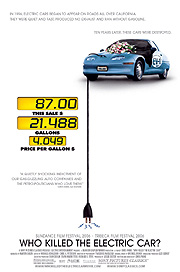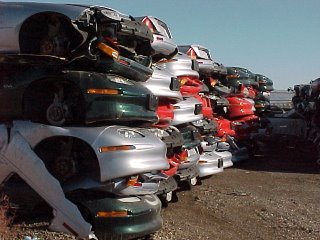Who Killed the Electric Car?... Really Sucks
 Earlier this evening I watched “Who Killed the Electric Car?” at the Aquaris Theatre in downtown Palo Alto. I’m not going to mince words… the movie completly sucked. The way that the film built its arguments was pathetically unconvincing and I left the movie not knowing whether or not electric cars really would have made any impact on climate change even if they hadn’t been “killed.” I am an environmentalist and I wanted to like this movie but I wound up very disappointed.
Earlier this evening I watched “Who Killed the Electric Car?” at the Aquaris Theatre in downtown Palo Alto. I’m not going to mince words… the movie completly sucked. The way that the film built its arguments was pathetically unconvincing and I left the movie not knowing whether or not electric cars really would have made any impact on climate change even if they hadn’t been “killed.” I am an environmentalist and I wanted to like this movie but I wound up very disappointed.My biggest overarching problem with the movie was its reliance on anecdotal “evidence” from electric vehicle owners to build almost all of its arguments. There were virtually no facts, studies or scientific explanations used to build any of the films arguments. Al Gore’s An Inconvenient Truth (which I also have some problems with) proved that it is possible to make a technical explanations that are digestible to the general public. There is a fine line between educating and boring people but simply relying on 10-20 electric vehicle owners statements that electric vehicles were great cars or that they were more efficient than gasoline powered without any explanation of why these statements were credible left me with lots of questions.
I was most interested to learn whether or not electric cars were truly more environmentally friendly than gasoline powered cars. While electric cars produce no emissions during the commute, they do create emissions at the power plant that supplies the electricity they run on. Hence, the trade off is between producing emissions from gasoline locally vs. producing emissions at the site of the power plant from burning coal. Coal is dirtier than gasoline but electric cars are more efficient than gas powered cars. The film has a Toyota executive that worked on electric cars saying the environmental benefits are low because of the need to burn coal versus one of the electric vehicle owners claiming that the electric vehicles efficiencies more than offset the emissions from burning coal. Yet, these are merely statements and they are not backed up by any explanation whatsoever. I would have loved to have seen figures that detailed the comparison and possibly a brief discussion of what percentage of electricity is generated from coal, natural gas and renewable sources. Furthermore, there is no discussion of the negative environmental impact of the electric vehicle batteries. To clarify, I’m not suggesting that electric vehicles wouldn’t have had a positive environmental impact (because I don’t know), rather that the movie does a terrible job of describing what I felt was its most compelling and interesting point.
Also, I found the arguments about the demand for the electric vehicles lacking any credibility. Of course the 10-20 people who bought electric vehicles and agreed to be interviewed for the movie were going to praise their cars… they were a self-selecting group of enthusiasts! I would have like to have seen comparisons between the electric vehicles power, safety and cost with those of their gasoline powered counterparts. Furthermore, the stats provided on the limited range of electric vehicles were also misleading. According to the film, the average American commutes 29 miles per day and electric vehicles had ranges of 60-100 miles. Thus, it is claimed that driving electric vehicles was possible for most consumers. Yet, while this may suffice for day-to-day driving most people eventually do take longer trips, which is often when public transportation is least convenient. For example, driving into San Francisco for dinner or a concert from the Peninsula or South Bay, which is a common occurrence for many, would be pushing this range limit. I just don’t find the films argument that the electric vehicles really provided a viable and/or desirable alternative to the combustion engine to be convincing.
 The movie also places way too much attention on GM’s decision to crush and shred its remaining EV1s. The implication is that GM was somehow involved in a conspiracy to ruin the EV1 and wanted to clear up all evidence of its existence. However, I don’t see any conspiracy in GM’s desire to try and erase the memory of a weird looking car with abysmal sales.
The movie also places way too much attention on GM’s decision to crush and shred its remaining EV1s. The implication is that GM was somehow involved in a conspiracy to ruin the EV1 and wanted to clear up all evidence of its existence. However, I don’t see any conspiracy in GM’s desire to try and erase the memory of a weird looking car with abysmal sales. Also, while I am strongly biased against all American car companies as inept bureaucracies, even I can’t see GM executives being dumb enough to scrap a product line that they believed would be profitable. In fact, the movie even points out that the costs of manufacturing were high and many of the sources of reoccurring revenue such as maintenance costs and spare parts were much lower in electric vehicles. It is still possible that GM executives were wrong about the profitability of electric vehicles, but if so, they were not alone. Off the top of my head, I know that Toyota, Honda and Ford also made electric vehicles that they no longer offer. If there really was money to be made in electric vehicles wouldn’t at least one of these car companies have tried to capture the market? The over-emphasis on GM’s decision to shred the EV1s was ridiculous and the automotive manufacturers conspiracy implications seemed propped-up.
Also, while I am strongly biased against all American car companies as inept bureaucracies, even I can’t see GM executives being dumb enough to scrap a product line that they believed would be profitable. In fact, the movie even points out that the costs of manufacturing were high and many of the sources of reoccurring revenue such as maintenance costs and spare parts were much lower in electric vehicles. It is still possible that GM executives were wrong about the profitability of electric vehicles, but if so, they were not alone. Off the top of my head, I know that Toyota, Honda and Ford also made electric vehicles that they no longer offer. If there really was money to be made in electric vehicles wouldn’t at least one of these car companies have tried to capture the market? The over-emphasis on GM’s decision to shred the EV1s was ridiculous and the automotive manufacturers conspiracy implications seemed propped-up.Lastly, I was shocked that the movie didn’t compare the environmental impact of electric vehicles with hybrids. Didn’t hybrids start selling about the same time that electric vehicle product lines were scrapped? Maybe the rise of the hybrid car is what killed the electric vehicle. I left the theatre thinking that if hybrids do have similar positive environmental impacts as electric cars than the movie really has no argument at all.










5 Comments:
Andrew, I didn't know you reviewed movies. After having read this exceptionally detailed review (nice pics!) of a movie that I had never heard of, I'll be even surer to stay away from it.
Curiously, I don't believe a word you say. You must not have seen te same film. By the way, the benefit of EV's is a no brainer, cars stuck in traffic burning thousands of gallons of WASTED FUEL vs electric vehicles stuck in traffic burning NO fuel. Duh.
You say you consider yourself an environmentalist, but you don't seem to mind a company scrapping perfectly good cars which could continue to be used until the end of their natural life. What a waste! Also isn't less servicing of an electric car good for the environment, if not for the car companies profits. Maybe the market model isn't necessarily the best.
And at least with an electric car, it's possible to swap out older batteries with newer better ones as they become available.
Anyway, lets see what the future holds. I'm sure it will be electric in one form or another. Renewable forms such as solar thermal and solar photovoltaic are improving all the time. Electric cars with be able to make use of that better efficiency. Gasoline while very profitable for many companies, is old hat...
I love the way automakers think about how we should deal with the environmental problem. Here is a recent quote from Nissan:
"Nissan said the most effective way in cushioning the environmental damage was by advancing the technology on internal combustion engines, which power most of today's cars."
http://news.moneycentral.msn.com/provider/providerarticle.aspx?feed=OBR&Date=20061211&ID=6262488
More of the same stuff! Great! That's exactly what the movie was try to say was wrong with car makers attitude.
Obviously this movie doesn't have all of the answers, but I think it gets people thinking about what else is possible, EXCEPT gasoline, fuel cells and hydrogen!
What we probably need is a combination of solutions that are an improvement on gasoline. So far there ain't many alternatives.
If anyone is really interested in a detailed analysis of the pros and cons of electric cars with background information, you should read Electric Vehicle Technology Explained (2003) by Larminie & Lowry.
It's very well written and easy to understand with lots of photos and graphs and compares the well to wheel pollution of the main energy options for vehicles. And it's not just a rosy picture of electric vehicles, but it does suggest they have an exciting future ahead.
Post a Comment
<< Home